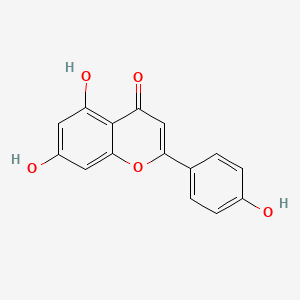m6A-centered Drug Response Information
General Information of the Drug (ID: M6APDG02230)
| Name |
APIGENIN
|
||||
|---|---|---|---|---|---|
| Synonyms |
apigenin; 520-36-5; 5,7-Dihydroxy-2-(4-hydroxyphenyl)-4H-chromen-4-one; Chamomile; Versulin; Spigenin; Apigenol; 4',5,7-Trihydroxyflavone; Apigenine; C.I. Natural Yellow 1; 5,7,4'-Trihydroxyflavone; Pelargidenon 1449; 5,7-Dihydroxy-2-(4-hydroxyphenyl)-4-benzopyrone; 2-(p-Hydroxyphenyl)-5,7-dihydroxychromone; UCCF 031; NSC 83244; UNII-7V515PI7F6; 5,7-Dihydroxy-2-(4-hydroxyphenyl)-4H-1-benzopyran-4-one; 5,7-dihydroxy-2-(4-hydroxyphenyl)chromen-4-one; CCRIS 3789; CHEBI:18388; CHEMBL28; EINECS 208-292-3; 4H-1-Benzopyran-4-one, 5,7-di
Click to Show/Hide
|
||||
| Status |
Investigative
|
||||
| Structure |
 |
||||
| Formula |
C15H10O5
|
||||
| InChI |
1S/C15H10O5/c16-9-3-1-8(2-4-9)13-7-12(19)15-11(18)5-10(17)6-14(15)20-13/h1-7,16-18H
|
||||
| InChIKey |
KZNIFHPLKGYRTM-UHFFFAOYSA-N
|
||||
| PubChem CID | |||||
| TTD Drug ID | |||||
Target Gene(s) and Their Upstream m6A Regulator, Together with the Effect of Target Gene(s) in Drug Response
The target genes involved in drug-target interaction (such as drug-metabolizing enzymes, drug transporters and therapeutic targets) and drug-mediated cell death signaling (including modulating DNA damage and repair capacity, escaping from drug-induced apoptosis, autophagy, cellular metabolic reprogramming, oncogenic bypass signaling, cell microenvironment, cell stemness, etc.) could be regulated by m6A regulator(s) and affected their corresponding drug response. You can browse detailed information on drug-related target gene(s) mediated by m6A regulators.
Androgen receptor (AR)
ETS-related transcription factor Elf-3 (ELF3)
| In total 1 mechanisms lead to this potential drug response | ||||
| Response Summary | Androgen receptor (AR) is a therapeutic target for APIGENIN. The ETS-related transcription factor Elf-3 (ELF3) has potential in affecting the response of APIGENIN through regulating the expression of Androgen receptor (AR). | [1], [2] | ||
Aromatase (CYP19A1)
Fat mass and obesity-associated protein (FTO)
| In total 1 mechanisms lead to this potential drug response | ||||
| Response Summary | Aromatase (CYP19A1) is a therapeutic target for APIGENIN. The Fat mass and obesity-associated protein (FTO) has potential in affecting the response of APIGENIN through regulating the expression of Aromatase (CYP19A1). | [3], [4] | ||
Cyclin-dependent kinase 6 (CDK6)
Fat mass and obesity-associated protein (FTO)
| In total 1 mechanisms lead to this potential drug response | ||||
| Response Summary | Cyclin-dependent kinase 6 (CDK6) is a therapeutic target for APIGENIN. The Fat mass and obesity-associated protein (FTO) has potential in affecting the response of APIGENIN through regulating the expression of Cyclin-dependent kinase 6 (CDK6). | [5], [6] | ||
Cytochrome P450 1B1 (CYP1B1)
Methyltransferase-like 14 (METTL14)
| In total 1 mechanisms lead to this potential drug response | ||||
| Response Summary | Cytochrome P450 1B1 (CYP1B1) is a therapeutic target for APIGENIN. The Methyltransferase-like 14 (METTL14) has potential in affecting the response of APIGENIN through regulating the expression of Cytochrome P450 1B1 (CYP1B1). | [7], [8] | ||
Methyltransferase-like 3 (METTL3)
| In total 1 mechanisms lead to this potential drug response | ||||
| Response Summary | Cytochrome P450 1B1 (CYP1B1) is a therapeutic target for APIGENIN. The Methyltransferase-like 3 (METTL3) has potential in affecting the response of APIGENIN through regulating the expression of Cytochrome P450 1B1 (CYP1B1). | [8], [9] | ||
References